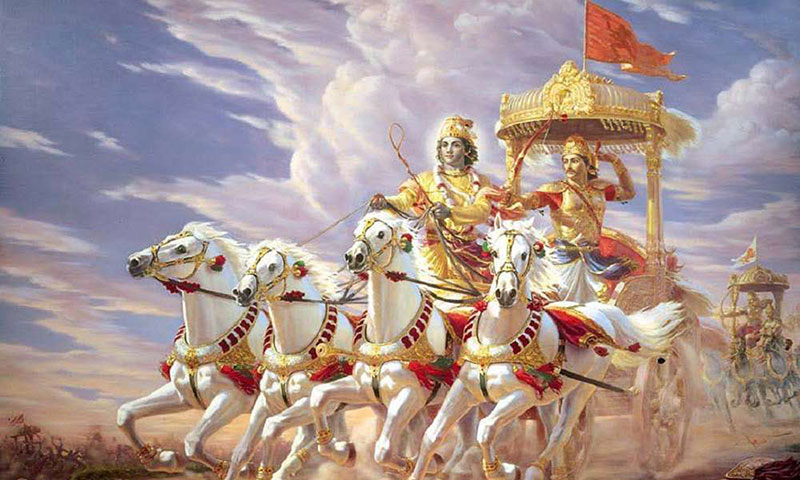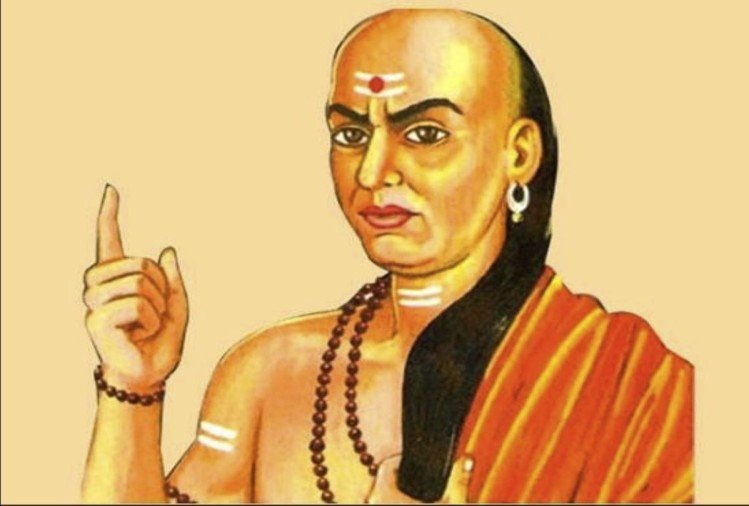Srimad Bhagawad Gita गुणत्रयविभागयोगः
चतुर्दशोऽध्यायः श्रीमद भगवतगीता|
atha caturdaśo’ dhyāyaḥ | guṇatrayavibhāgayogaḥ
श्रीभगवानुवाच ।
परं भूयः प्रवक्ष्यामि ज्ञानानां ज्ञानमुत्तमम् ।
यज्ज्ञात्वा मुनयः सर्वे परां सिद्धिमितो गताः ॥ १४- १ ॥
The Blessed Lord Said:
I shall tell you again the supreme knowledge – the best of all knowledges, knowing which all the sages have attained supreme felicity from hence.
इदं ज्ञानमुपाश्रित्य मम साधर्म्यमागताः ।
सर्गेऽपि नोपजायन्ते प्रलये न व्यथन्ति च ॥ १४- २ ॥
By resorting to this knowledge they, having attained to My nature, are not reborn even at the time of creation nor are they distressed at the time of dissolution.
मम योनिर्महद् ब्रह्म तस्मिन्गर्भं दधाम्यहम् ।
सम्भवः सर्वभूतानां ततो भवति भारत ॥ १४- ३ ॥
The great Nature is My womb; in that place the germ, and from that, O descendant of Bharata, is the origin of all beings.
Srimad Bhagawad Gita गुणत्रयविभागयोगः संपूर्ण रामायण पढ़ने के लिए यहां क्लिक करें
सर्वयोनिषु कौन्तेय मूर्तयः सम्भवन्ति याः ।
तासां ब्रह्म महद्योनिरहं बीजप्रदः पिता ॥ १४- ४ ॥
Whatever forms, O son of Kunti, are born in different wombs, of them the great Nature is the womb, and I am the seed-giving father.
सत्त्वं रजस्तम इति गुणाः प्रकृतिसम्भवाः ।
निबध्नन्ति महाबाहो देहे देहिनमव्ययम् ॥ १४- ५ ॥
Sattva, Rajas and Tamas – these Gunas, O mighty-armed one, that are born of Nature (Prakriti), bind fast the immutable, embodied being in this body.
तत्र सत्त्वं निर्मलत्वात्प्रकाशकमनामयम् ।
सुखसङ्गेन बध्नाति ज्ञानसङ्गेन चानघ ॥ १४- ६ ॥
Of these, Sattva on account of its stainlessness is luminous and free from evil; it binds (the embodied self) by attachment to happiness and by attachment to knowledge, O sinless one (Arjuna).
रजो रागात्मकं विद्धि तृष्णासङ्गसमुद्भवम् ।
तन्निबध्नाति कौन्तेय कर्मसङ्गेन देहिनम् ॥ १४- ७ ॥
Know Rajas to be of the nature of passion, the source of desire and attachment; O son of Kunti, it binds fast the embodied self by attachment to action.
Srimad Bhagawad Gita गुणत्रयविभागयोगः संपूर्ण रामायण पढ़ने के लिए यहां क्लिक करें
तमस्त्वज्ञानजं विद्धि मोहनं सर्वदेहिनाम् ।
प्रमादालस्यनिद्राभिस्तन्निबध्नाति भारत ॥ १४- ८ ॥
But know Tamas to be born of ignorance and deluding all embodied beings; it binds fast, O descendant of Bharata, through inadvertence, laziness and sleep.
सत्त्वं सुखे सञ्जयति रजः कर्मणि भारत ।
ज्ञानमावृत्य तु तमः प्रमादे सञ्जयत्युत ॥ १४- ९ ॥
Sattva binds (one) to happiness, Rajas, O descendant of Bharata, (binds one) to work, while Tamas by covering knowledge binds (one) to inadvertence, etc.
रजस्तमश्चाभिभूय सत्त्वं भवति भारत ।
रजः सत्त्वं तमश्चैव तमः सत्त्वं रजस्तथा ॥ १४- १० ॥
Sattva manifests, O descendant of Bharata, overpowering Rajas and Tamas; Rajas (manifests) overpowering Sattva and Tamas and likewise Tamas (manifests) overpowering Sattva and Rajas.
सर्वद्वारेषु देहेऽस्मिन्प्रकाश उपजायते ।
ज्ञानं यदा तदा विद्याद्विवृद्धं सत्त्वमित्युत ॥ १४- ११ ॥
When through all the sense-openings in this body the light of knowledge radiates, then indeed one should know that Sattva predominates.
संपूर्ण रामायण पढ़ने के लिए यहां क्लिक करें
लोभः प्रवृत्तिरारम्भः कर्मणामशमः स्पृहा ।
रजस्येतानि जायन्ते विवृद्धे भरतर्षभ ॥ १४- १२ ॥
Greed, activity, undertaking of works, restlessness, desire – these prevail, O best of Bharatas, when Rajas predominates.
अप्रकाशोऽप्रवृत्तिश्च प्रमादो मोह एव च ।
तमस्येतानि जायन्ते विवृद्धे कुरुनन्दन ॥ १४- १३ ॥
Darkness, inactivity, inadvertence, as also delusion – these prevail, O descendant of Kuru (Arjuna), when Tamas predominates.
यदा सत्त्वे प्रवृद्धे तु प्रलयं याति देहभृत् ।
तदोत्तमविदां लोकानमलान्प्रतिपद्यते ॥ १४- १४ ॥
If the embodied self meets with death when Sattva is predominant, then it attains the pure spheres of the worshippers of the highest deities.
रजसि प्रलयं गत्वा कर्मसङ्गिषु जायते ।
तथा प्रलीनस्तमसि मूढयोनिषु जायते ॥ १४- १५ ॥
Srimad Bhagawad Gita गुणत्रयविभागयोगः संपूर्ण रामायण पढ़ने के लिए यहां क्लिक करें
If it meets with death when Rajas is predominant, then it is born amongst those who are attached to work; likewise if it meets with death when Tamas is predominant, then it is born in the wombs of irrational species.
कर्मणः सुकृतस्याहुः सात्त्विकं निर्मलं फलम् ।
रजसस्तु फलं दुःखमज्ञानं तमसः फलम् ॥ १४- १६ ॥
The result of virtuous actions is said to be Sāttvika and pure, the result of Rajas is pain, while ignorance is the result of Tamas.
सत्त्वात्सञ्जायते ज्ञानं रजसो लोभ एव च ।
प्रमादमोहौ तमसो भवतोऽज्ञानमेव च ॥ १४- १७ ॥
From Sattva results knowledge, from Rajas only greed, and from Tamas nothing but inadvertence, delusion and ignorance.
ऊर्ध्वं गच्छन्ति सत्त्वस्था मध्ये तिष्ठन्ति राजसाः ।
जघन्यगुणवृत्तिस्था अधो गच्छन्ति तामसाः ॥ १४- १८ ॥
Those who abide in Sattva go upwards (to higher spheres), the Rājasika dwell in the middle (spheres), and the Tāmasika. Dwelling in the functions of the lowest Guna, go downwards (to lower spheres).
नान्यं गुणेभ्यः कर्तारं यदा द्रष्टानुपश्यति ।
गुणेभ्यश्च परं वेत्ति मद्भावं सोऽधिगच्छति ॥ १४- १९ ॥
When the seer beholds no (active) agent other than Gunas, and knows that which is beyond the Gunas, he attains My being.
Srimad Bhagawad Gita गुणत्रयविभागयोगः संपूर्ण रामायण पढ़ने के लिए यहां क्लिक करें
गुणानेतानतीत्य त्रीन्देही देहसमुद्भवान् ।
जन्ममृत्युजरादुःखैर्विमुक्तोऽमृतमश्नुते ॥ १४- २० ॥
Having transcended these three Gunas, which are the cause of this body, the embodied self, bereft of birth, death, old age and misery, attains immortality.
अर्जुन उवाच ।
कैर्लिङ्गैस्त्रीन्गुणानेतानतीतो भवति प्रभो ।
किमाचारः कथं चैतांस्त्रीन्गुणानतिवर्तते ॥ १४- २१ ॥
Arjuna said:
By what characteristics, O Lord, is one who has transcended these three Gunas known? What is his conduct, and how does he transcend these three Gunas?
श्रीभगवानुवाच ।
प्रकाशं च प्रवृत्तिं च मोहमेव च पाण्डव ।
न द्वेष्टि सम्प्रवृत्तानि न निवृत्तानि काङ्क्षति ॥ १४- २२ ॥
The Blessed Lord said:
He who does not hate when the light (of knowledge), activity and delusion arise, O son of Pāndu, nor desires them when they cease;
उदासीनवदासीनो गुणैर्यो न विचाल्यते ।
गुणा वर्तन्त इत्येवं योऽवतिष्ठति नेङ्गते ॥ १४- २३ ॥
He who rests like one indifferent and is not disturbed by the Gunas, who, realizing that the Gunas alone function, is steady and does not waver;
समदुःखसुखः स्वस्थः समलोष्टाश्मकाञ्चनः ।
तुल्यप्रियाप्रियो धीरस्तुल्यनिन्दात्मसंस्तुतिः ॥ १४- २४ ॥
Alike in pleasure and pain, Self-abiding, regarding a clod of earth, a stone and gold as of equal worth, the same towards agreeable and disagreeable objects, calm, and the same to praise and blame bestowed on him;
Srimad Bhagawad Gita गुणत्रयविभागयोगः संपूर्ण रामायण पढ़ने के लिए यहां क्लिक करें
मानापमानयोस्तुल्यस्तुल्यो मित्रारिपक्षयोः ।
सर्वारम्भपरित्यागी गुणातीतः स उच्यते ॥ १४- २५ ॥
The same in honour and dishonour, the same towards friend and foe, habituated to renounce all actions – such a person is said to have transcended the Gunas.
मां च योऽव्यभिचारेण भक्तियोगेन सेवते ।
स गुणान्समतीत्यैतान्ब्रह्मभूयाय कल्पते ॥ १४- २६ ॥
He who serves Me alone through the unswerving Yoga of devotion, transcends these Gunas and becomes fit for the state of Brahman.
ब्रह्मणो हि प्रतिष्ठाहममृतस्याव्ययस्य च ।
शाश्वतस्य च धर्मस्य सुखस्यैकान्तिकस्य च ॥ १४- २७ ॥
For I am the embodiment of Brahman, of immutable immortality, of the eternal religion and of absolute bliss.
That the ocean of relative existence, which results from the attachment to the Gunas, which are subservient to the Lord Sri Krishna, is easily crossed by His devotees, is declared by the Lord in this fourteenth chapter.
ॐ तत्सदिति श्रीमद्भगवद्गीतासूपनिषत्सु
ब्रह्मविद्यायां योगशास्त्रे श्रीकृष्णार्जुनसंवादे
गुणत्रयविभागयोगो नाम चतुर्दशोऽध्यायः ॥ १४ ॥



